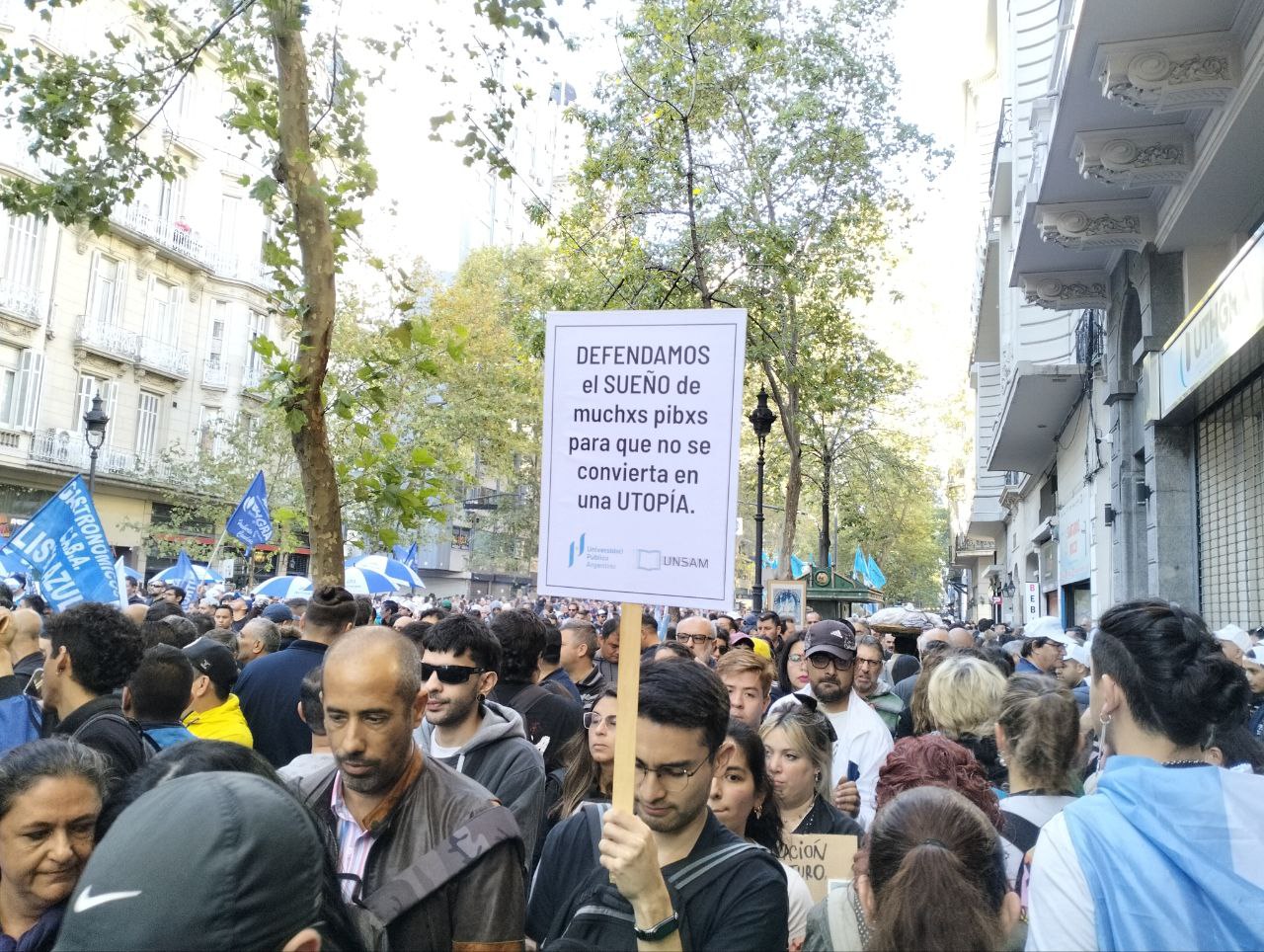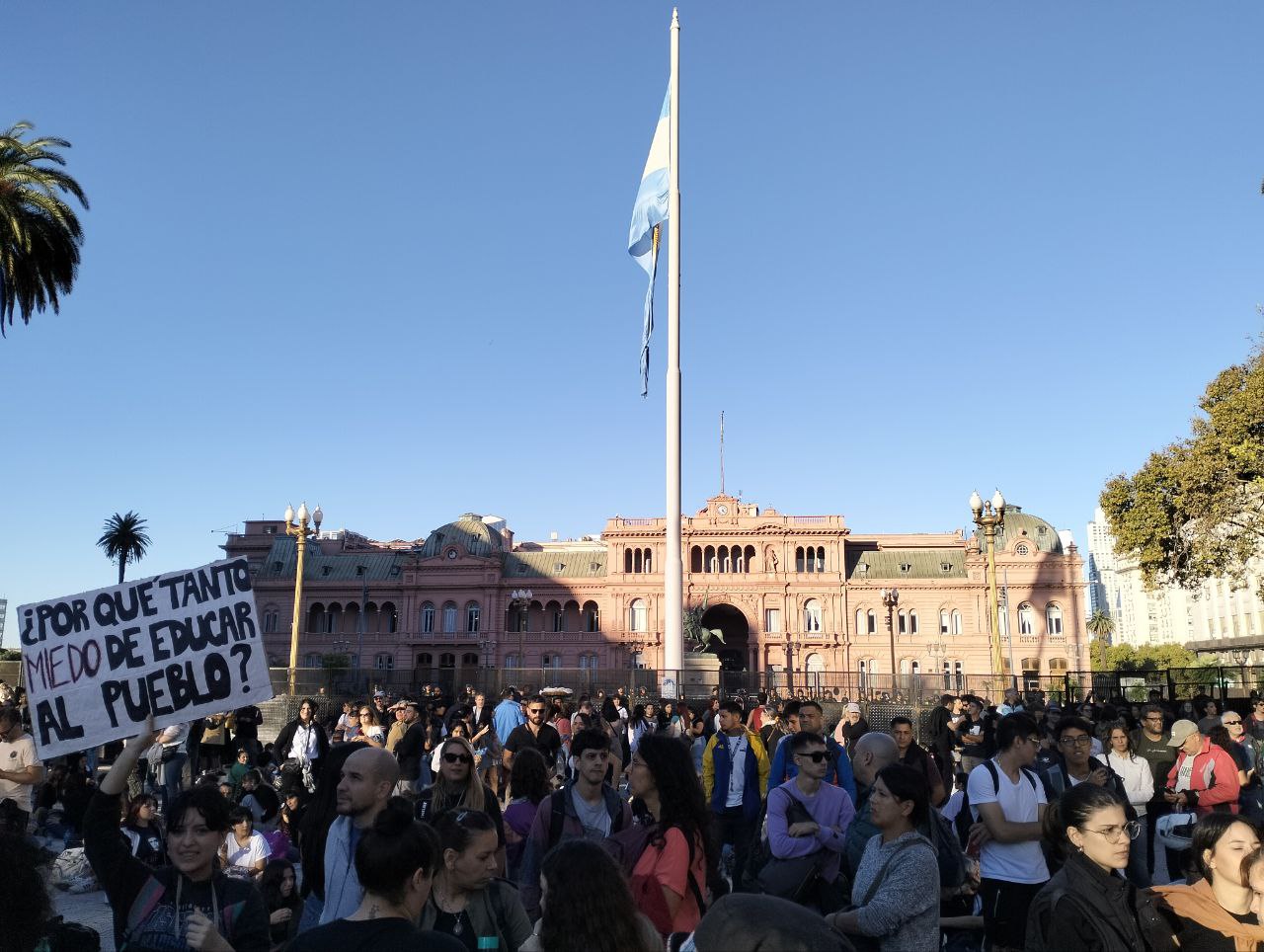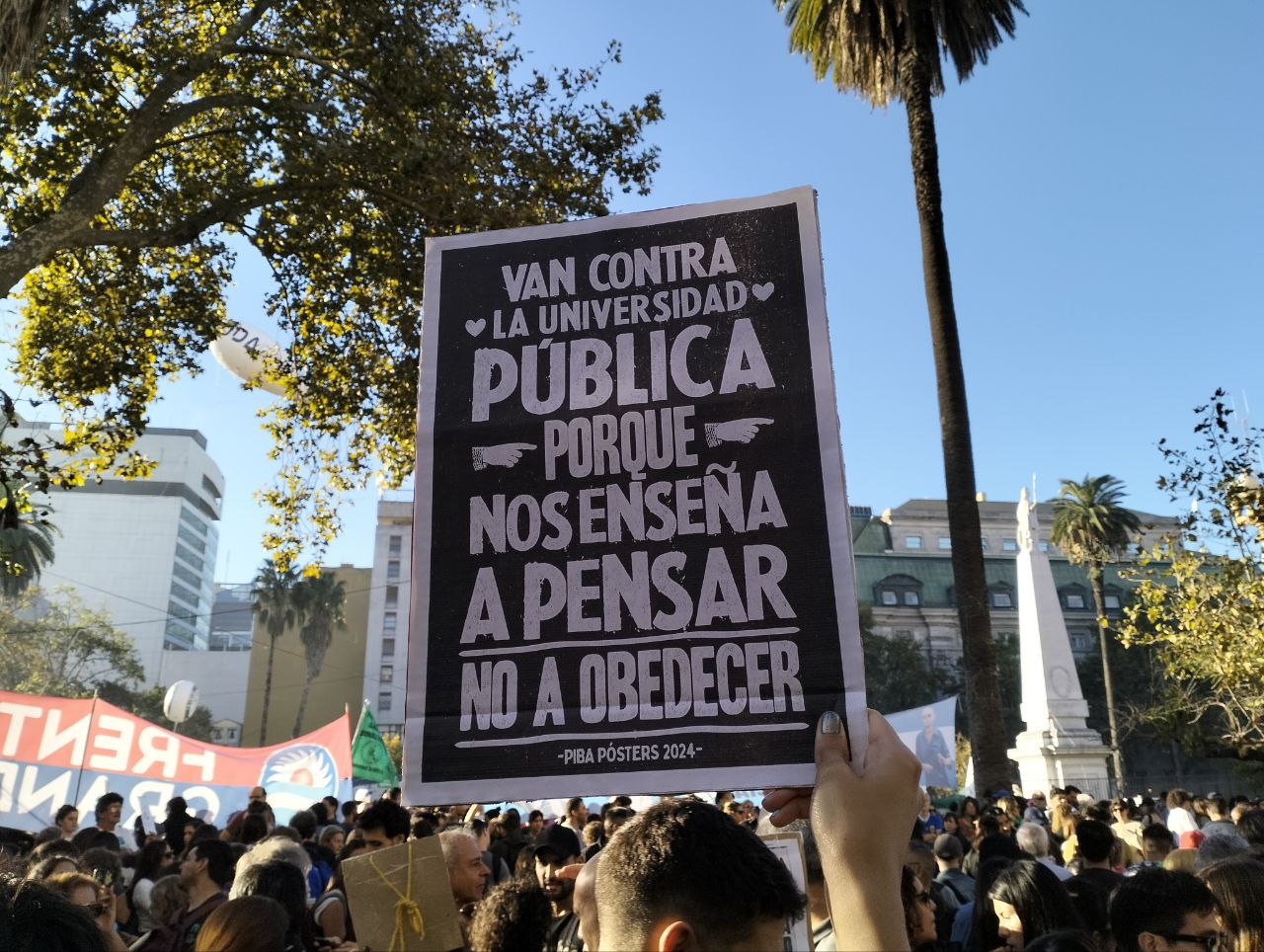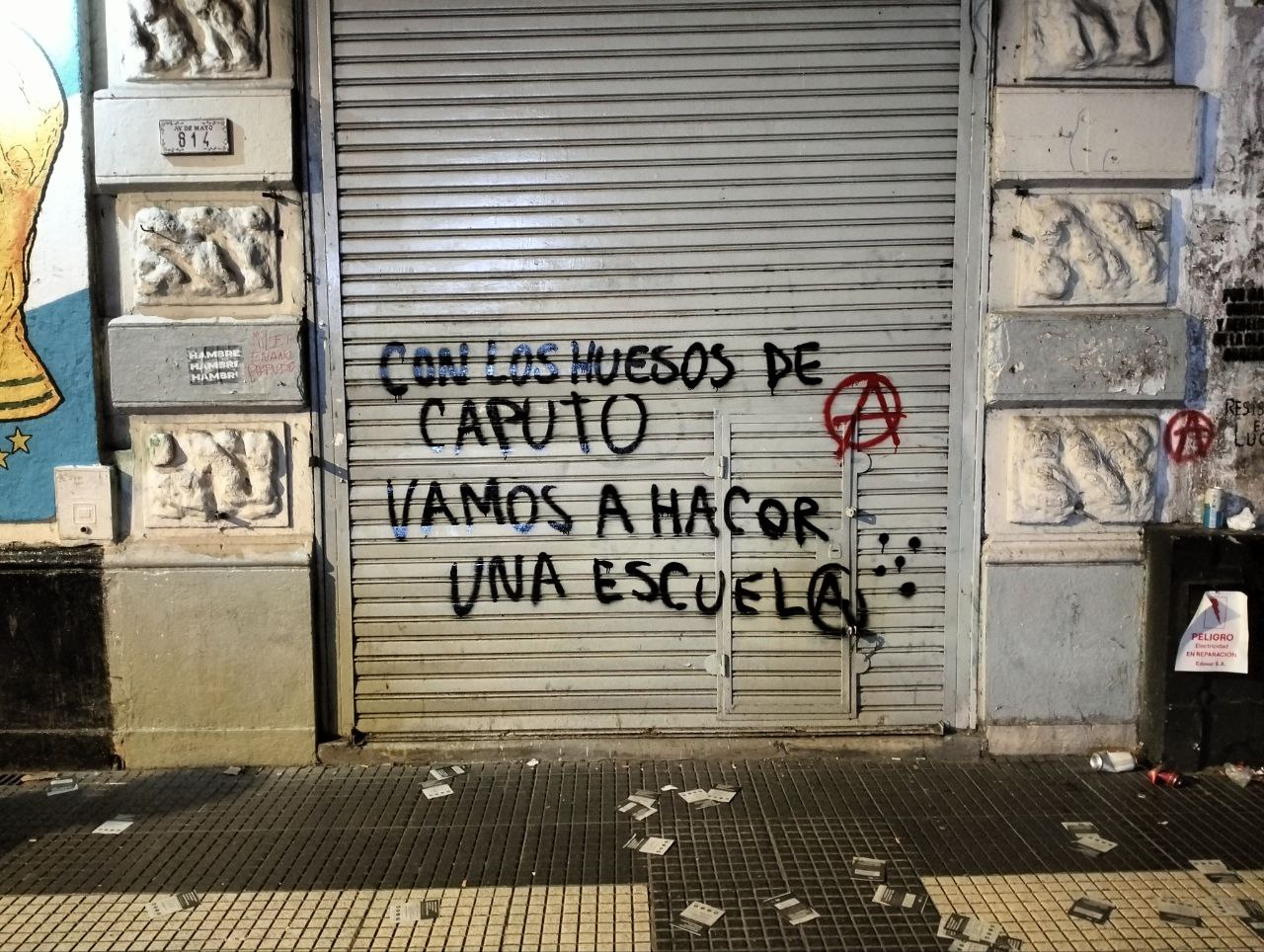Listen to this note:
"Today is a special day," says a teacher to his two female companions when boarding a crowded car at the Constitución station on line C of the Subway, which connects with Avenida de Mayo. "Everyone gets off at Avenida de Mayo," one of them later adds. And his prediction is not wrong.
One month after March for Remembrance Day for Truth and Justice "who remembers that in Argentina 30 thousand people were detained and disappeared due to political persecution during the last military dictatorship," the president Javier Milei was once again confronted with an eloquent image of the massive discontent of a sector of Argentine society against its policies: the festive, multitudinous, mocking, proactive opposition to its privatization policies.
The president, who defends capitalism without regulation from the State and won the favor of the electoral majority in November 2023 with the promise of cutting superfluous expenses in public administration, has maintained that he will seek to destroy as many public entities as possible during his term. management, from the privatization of Aerolíneas Argentinas to the closure of the historic Télam news agency, the cutting of thousands of jobs or the blurring of the National Institute of Cinema and Audiovisual Arts (INCAA), in addition to promoting the country's entry into the conflict between Israel and Iran, in favor of Tel Aviv, or the installation of a US military base on the strategic island of Tierra del Fuego, at the southern end of the American continent.

Faced with this warning, which includes cutting off the supply of resources to the country's public universities, this Tuesday, April 23, around one and a half million Argentines took to the streets nationwide to defend public education, according to organizers, among students, teachers, researchers, education workers and supporters.
In Buenos Aires, where the organizing group said that 800,000 people marched from different educational centers and Congress, the protesters advanced for hours towards the historic Plaza de Mayo and the surrounding streets, among batucada, choripanes, fernet, festive songs of the Argentine repertoire, combative and carnivalesque slogans, some even remembering the student fight of Harry Potter and his companions against the dark lord, and with a clear position: the defense of free education to benefit socially vulnerable sectors with the opportunity for professional training and, consequently, the country as a whole.
An idea is repeated throughout the day: without public education, none of those present would be what they are: first graduate in the family, teacher, student, aspiring scientist or girl who advances from today: When I grow up I want to go to the UBA ( Buenos Aires' University).
And clear about who his political rival is, provocations also rain down on the current executive branch. "Study, don't be Adorni," reads a poster in reference to Manuel Adorni, presidential spokesperson in charge of spectacularizing on TikTok his usually mocking responses to journalists who question the Casa Rosada. Or, on the metal fences that the police placed to protect the executive headquarters in the Plaza de Mayo, a young woman writes with spray "Libertontos" and a red arrow indicating where to look to find them.

"They are going against the public university because it teaches us to think, not to obey," the banners say repeatedly. "To educate is to fight and silence is not my language," notes a sticker attached to the wall.
"Cloned more sells homeland," expresses the slogan on a blanket on a map of the Malvinas Islands. And one more call not to give up: "May we not be the generation that saw the public university die."
Already crowded in the public square, the attendees sing songs from the Fabulosos Cadillacs or the classic Andean repertoire, remember the workerist Rodolfo Walsh or express discomfort:
And you see it,
and you see it,
the one who doesn't jump
voted for Milei.
The massive mobilization was celebrated by the rock icon Charly García, the one who promised that the dinosaurs will disappear, and by the Aymara leader Evo Morales, among many other planetary witnesses: the eyes of the world follow the convulsions that derive from the president's attempt Argentine government of favoring large private capital in one of the largest nations on the planet, and to which organized society reiterates its disagreement.

One of the members of the Mothers of Plaza de Mayo movement, Taty Almeida, speaks from the central pavilion towards the closing of the event and remembers among applause that she herself trained in public education. In addition to remembering that his son, Alejandro Almeida, was enrolled in a medical degree at the University of Buenos Aires when he was arrested and disappeared.
The Nobel Peace Prize winner Adolfo Pérez Esquivel, in turn, recalled that a request for impeachment against Javier Milei is already being promoted by the legislative branch.
In the statement of the rally, which ended around 6:40 p.m., while an almost full moon appeared behind the Casa Rosada, the organization claimed that it had been forced to return to slogans from 20 years ago: "No! worker or worker below the poverty line!?
The document called for regulating the situation of retirees and restoring the National Teacher Incentive Fund (Fonid), as well as reversing the massive layoffs. ?Today universities lack the budget to support their own scholarships, a budget and student welfare policies are needed to be able to study. Given this, do we assume the task of unwaveringly defending access to education for the vast majority?
The positioning closed with a general call to Argentine society to continue defending public education in the country. As soon as the speech concluded, the music from the pavilion made the attendees dance and chant to the rock of Indio Solari.
In the heat of the mobilization, Vice President Victoria Villarroel, a denier of the crimes of the last military dictatorship, launched from Mothers of Plaza de Mayo Hebe de Bonafini, who died in November 2022.
In addition, President Milei shared on Instagram the image of a lion drinking a cup of coffee with the caption: "Tears of left-handed people." Although he later deleted the image, he was sharing it and replicated it by his supporters, who celebrated the mocking tone of the meme.
Argentine society remains divided. Although the massive demonstration made clear the willingness of thousands to express their disagreement, it is not difficult to find among the street conversation in different parts of the country those who remain convinced of their vote in favor of the libertarian. The political skepticism remains, to which Milei appears as a craving for a solution due to his non-traditional aggressiveness in institutional political language. The prolonged economic and social fatigue in Argentina led to this scenario.
One thing is clear: the seizures will continue. The executive emphasizes from his primary sphere, social networks, that he will continue to insist on his rhetoric of provocation and boasting.
The end of the word in the temple does not close the festival. The attendees advance between drums, waving wiphalas and panpipes towards the dispersion, recovering slogans on the reels of their cell phones, smiling, crowded together, collecting testimonies of what they experienced. An intervention to the famous engraving by Francisco de Goya shows a tormented vampire leader next to a legend: "The fallacy of the free market produces monsters."

And the protesters, between the force of the concentration, slogans, celebrations, criticism, humor, tenderness, irony, demands for social opportunities and memory, reiterate their political position: "Milei, listen, you are the dictatorship."

You may be interested in: El Salvador: exception regime, instrument to criminalize community leaders




